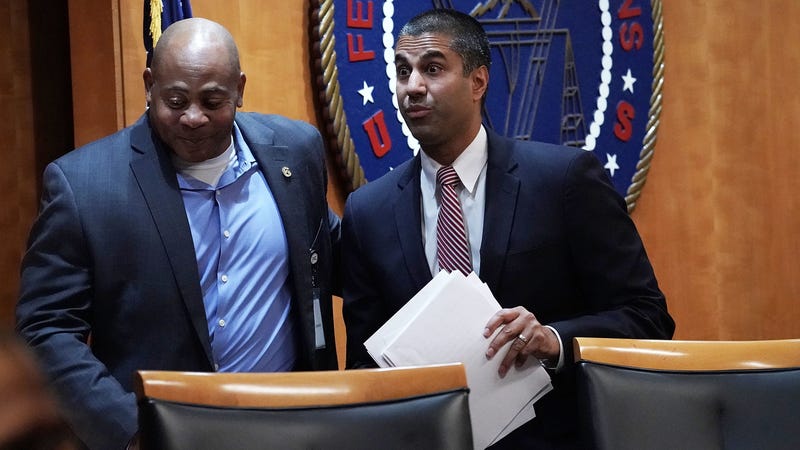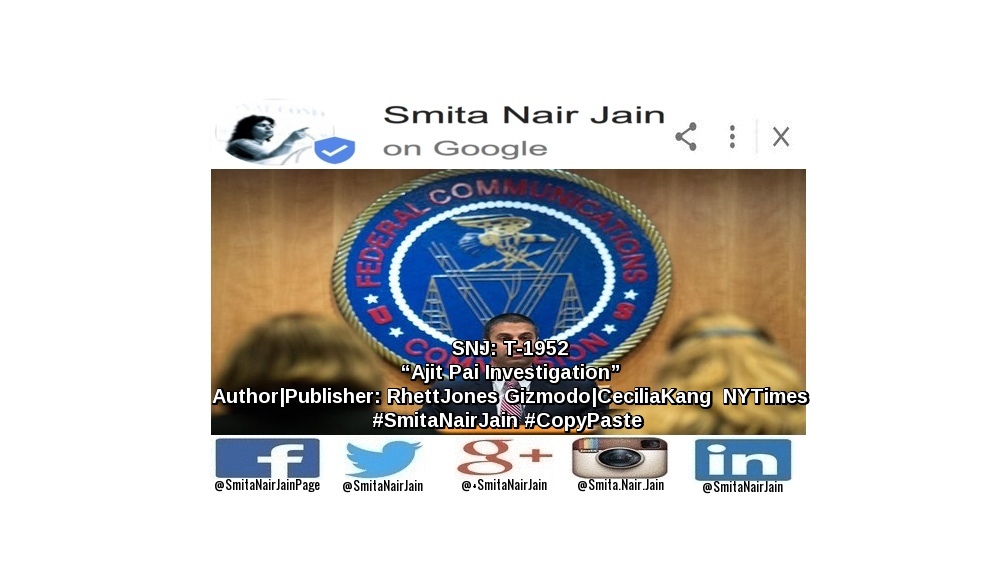Ajit Pai Is Reportedly Being Investigated by the FCC’s Inspector General [UPDATED]

During his short tenure as chairman of the Federal Communications Commission, Ajit Pai has made so many destructive and controversial decisions it’s hard to keep up. However, his decision to change broadcast TV ownership rules, clearing the way for a massive acquisition by the Sinclair Broadcast Group, has always been one of the shadiest. And it was apparently so shady that the FCC’s inspector general has opened an investigation into any wrongdoing.
Sinclair is currently seeking approval for a proposed $3.9 billion acquisition of Tribune Media that would put its stations in seven out of 10 US households. The deal raises concerns that this particular media blob would gut local TV news coverage and place it in the hands of one all-controlling giant. Back in April, Pai’s FCC changed the rules that cap how much ownership of local TV markets a single entity can possess. Committees in both the House and Senate called for an investigation any improper contact between Pai and executives of Sinclair. According to The New York Times, that investigation has actually been underway for some time. From the report:
By the end of the year, in a previously undisclosed move, the top internal watchdog for the F.C.C. opened an investigation into whether Mr. Pai and his aides had improperly pushed for the rule changes and whether they had timed them to benefit Sinclair, according to Representative Frank Pallone of New Jersey and two congressional aides.
[…]
It was unclear the extent of the inspector general’s investigation or when it might conclude, but the inquiry puts a spotlight on Mr. Pai’s decisions and whether there had been coordination with the company. It may also force him to answer questions that he has so far avoided addressing in public.
Pai’s relationships with big telecoms and media companies have been the subject of scrutiny since he took over the agency, particularly his relationship with Verizon, for which he worked as a lawyer before joining the federal government. In November, the Times published an investigation that found Pai and his aides had numerous contacts with Sinclair leadership, and Pai himself met with the company’s executive chairman a few days before he took on his new role at the FCC.
It’s not a good idea to put so much control of local media into the hands of any single corporation, but Sinclair has been specifically worrisome due to its requirement that stations air “must-run” packages of pre-recorded content that promotes a conservative agenda. Former Trump spokesman Boris Epshtyn became Sinclair’s chief political analyst after leaving the White House. And according to a Politico report, the Trump campaign made a deal with Sinclair in 2016 that exchanged more access to the candidate in return for favorable coverage.
We’ve reached out to the FCC and the inspector general’s office for comment on the newly disclosed investigation, and we’ll update this post when we receive a reply. Following lawmaker’s calls for an investigation in November, a spokesperson for Pai’s office told The New York Times, “For many years, Chairman Pai has called on the F.C.C. to update its media ownership regulations.” They said, “The chairman is sticking to his long-held views, and given the strong case for modernizing these rules, it’s not surprising that those who disagree with him would prefer to do whatever they can to distract from the merits of his proposals.”
The FCC inspector general, David L. Hunt, was appointed to his position in 2011 under the Obama administration, so there’s little reason to believe that he would hold any favorable bias toward Trump’s cabinet members.
Numerous members of the administration are the subject of various investigations at the moment, including the EPA’s Scott Pruitt, Veterans Affairs Secretary David Shulkin and his staff, and Interior Secretary Ryan Zinke. And of course, many members of the White House including the president himself are subjects of Robert Mueller’s investigation into Russian election meddling and obstruction of justice. Throw in the recent resignation of Staff Secretary Rob Porter, which has set off a firestorm of concern over the 130 political appointees who still haven’t managed to get a security clearance, and it’s quite apparent this administration has some staffing problems.
We have no word on the status of the investigation of Chairman Pai, but in the short term, it could easily complicate the FTC’s review of the Sinclair deal. And wouldn’t that be a shame?
UPDATE: The FCC Inspector General’s office sent this statement: “Our long-standing policy is not to comment on the existence, non-existence or status of an investigation.”
<!–
<!–
Disclosure: Smita Nair Jain doesn’t own stock in any publicly traded companies. She has equivalent of the American 401(k) plan in India that is automatically managed. (Updated: February 16, 2018)
<!–esi
–>

WASHINGTON — Last April, the chairman of the Federal Communications Commission, Ajit Pai, led the charge for his agency to approve rules allowing television broadcasters to greatly increase the number of stations they own. A few weeks later, Sinclair Broadcasting announced a blockbuster $3.9 billion deal to buy Tribune Media — a deal those new rules made possible.
By the end of the year, in a previously undisclosed move, the top internal watchdog for the F.C.C. opened an investigation into whether Mr. Pai and his aides had improperly pushed for the rule changes and whether they had timed them to benefit Sinclair, according to Representative Frank Pallone of New Jersey and two congressional aides.
“For months I have been trying to get to the bottom of the allegations about Chairman Pai’s relationship with Sinclair Broadcasting,” Mr. Pallone, the top Democrat on the committee that oversees the F.C.C., said in the statement to The New York Times. “I am grateful to the F.C.C.’s inspector general that he has decided to take up this important investigation.”
It was unclear the extent of the inspector general’s investigation or when it might conclude, but the inquiry puts a spotlight on Mr. Pai’s decisions and whether there had been coordination with the company. It may also force him to answer questions that he has so far avoided addressing in public.
The inquiry could also add ammunition to arguments against the Sinclair-Tribune deal. Public interest groups and Democratic lawmakers, including Mr. Pallone, are strongly opposed to the deal, arguing that it would reduce the number of voices in media and diminish coverage of local news.
Sinclair’s chief executive, Chris Ripley, has called Mr. Pai’s relaxation of media ownership rules a “landmark” development for his company and the industry. A union of Sinclair and Tribune would create the nation’s biggest television broadcaster, reaching seven out of 10 American homes. The F.C.C. and Justice Department are widely expected to approve the merger in the coming weeks.
The office of F.C.C. inspector general, which is a nonpartisan role that reports to the agency and regularly updates Congress on some investigations, said it would “not comment on the existence or the nonexistence of an investigation.”
Mr. Pai’s office and Sinclair declined to comment. When the legislators called for an investigation in November, a spokesman for the F.C.C., representing Mr. Pai, said the allegations of favoritism were “baseless.”
“For many years, Chairman Pai has called on the F.C.C. to update its media ownership regulations,” the F.C.C. spokesman said. “The chairman is sticking to his long-held views, and given the strong case for modernizing these rules, it’s not surprising that those who disagree with him would prefer to do whatever they can to distract from the merits of his proposals.”
A New York Times investigation published in August found that Mr. Pai and his staff members had met and corresponded with Sinclair executives several times. One meeting, with Sinclair’s executive chairman, took place days before Mr. Pai, who was appointed by President Trump, took over as F.C.C. chairman.
Sinclair’s top lobbyist, a former F.C.C. official, also communicated frequently with former agency colleagues and pushed for the relaxation of media ownership rules. And language the lobbyist used about loosening rules has tracked closely to analysis and language used by Mr. Pai in speeches favoring such changes.
In November, several Democrats in Congress, including Mr. Pallone, called on the inspector general’s office to explore all communications — including personal emails, social media accounts, text messages and phone calls — between Sinclair and Mr. Pai and his staff.
The lawmakers also asked for communications between Mr. Pai’s office and the White House. They pointed to a report in March 2017 from The New York Post, in which Mr. Trump is said to have met with Sinclair’s executive chairman, David Smith, and discussed F.C.C. rules.
Some members of Congress have asked Mr. Pai for such communications, but he has not responded.
The F.C.C. inspector general, David L. Hunt, and other officials in his office met with aides in the House and Senate, including those for Mr. Pallone, in December. The F.C.C. officials told the aides that they would open an investigation, according to four people with knowledge of the meetings.
In later conversations, F.C.C. officials said that an investigation was underway, according to two other aides.
The aides, all of whom work for Democratic lawmakers, would speak only on the condition of anonymity because the investigation is private.
The investigation could put the F.C.C. inspector general’s office in a high-profile situation.
Mr. Hunt was promoted to lead the office in 2011 by Julius Genachowski, a Democrat and the F.C.C.’s then-chairman, after working in the agency for about five years. The office investigates potential violations of civil and criminal laws by agency staff members and companies that receive money from the agency. On Wednesday, the inspector general for veterans affairs, a similar position, released a scathing report about travel spending by the department’s secretary, David J. Shulkin.
The F.C.C.’s inspector general does not make public all of its investigations. But details of some investigations have been disclosed through Freedom of Information Act requests and through the office’s reports to Congress.
In 2015, the inspector general’s office looked into possible coordination between the Obama administration and the F.C.C. chairman at the time, Tom Wheeler, on the creation of so-called net neutrality rules. The rules prevented broadband providers from blocking or slowing traffic to consumers. The inspector general said its investigation could not find clear improper conduct.
Antitrust experts said this new investigation may complicate the reviews of the Sinclair-Tribune deal by the F.C.C. and the Justice Department. Even if the deal were approved, they said, any conclusions of improper conduct by Mr. Pai could give fuel to critics to challenge the review in courts.
“An investigation could cast a cloud over the whole process,” said Andrew Schwartzman, a senior fellow at Georgetown Law Center’s Institute for Public Representation. “For the review, knowledge of an investigation could generate caution and even delay completion of the deal.”
ABOUT THE AUTHOR
Disclosure: Smita Nair Jain doesn’t own stock in any publicly traded companies. She has equivalent of the American 401(k) plan in India that is automatically managed. (Updated: February 16, 2018)
Disclaimer: The opinions, beliefs and viewpoints expressed by the various author(s), publisher(s) and forum participant(s) on this web site do not necessarily reflect the opinions, beliefs and viewpoints of the @SmitaNairJain or official policies of the #SmitaNairJainHashtags: #COPYPASTE #womenwhocode #womenintech #womenindigital #womenindatascience #thoughtleaders #tedxtalks #tedxspeakers #tedxmotivationalspeakers #tedx #technologyfuturistkeynotespeakers #technology #tech #strategy #smitanairjain #motivationalspeakertedtalks #motivationalspeakers #motivationalspeakeronleadership #motivationalspeakerbusiness #mentor #leadership #keynotespeakers #informationtechnology #futuristtechnologyspeakers #futuristspeakers #futuristmotivationalspeakers #futuristkeynotespeakers #fintech #digitalfuturistspeakers #businessfuturistspeakers
Categories & Tags: #smitanairjain, @smitanairjain, smita nair jain, smitanairjain, smitha nair jain</smitha nair jain
Take A Minute To Follow Me On Social Media
Facebook: @SmitaNairJainPage Twitter: @SmitaNairJain Instagram: @smita.nair.jain LinkedIn: @smitanairjain Google+: @smitanairjain
I’m interested in your feedback on this page. Tell us what you think.



 CeciliaKang
CeciliaKang
You must be logged in to post a comment.